The first person to email my PixlBit email account can have the card that came with the game with a code meant for use with the original Ragnarok Online. Apparently, it gives something like a beginner's pack of items. I don't play RO, so there's no point in me keeping it.
Ragnarok DS Review
|
|
See PixlBit's Review Policies

On 04/29/2010 at 01:28 PM by Jason Ross The MMORPG has been transformed into a DS RPG. Did the game transition well? |

For die-hard fans of the RPG genre or of Ragnarok Online who want something to sink time into, but don't mind very repetitive gameplay and terrible partner AI.
Ragnarok DS is a title based on the internationally known, Ragnarok Online. It's namesake began in 2002, based on mostly Norse mythology, providing, at a cursory glance, typical MMORPG play through a 3D world with 2D characters. Ragnarok DS borrows from Ragnarok Online in virtually every significant way, from character design and classes to enemies, combat systems, and special abilities. Unfortunately, though, in removing the MMO aspects of Ragnarok Online, Gravity seems to have forgotten how to optimize Ragnarok DS's DS capabilities.
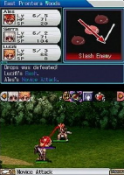
To begin, there are several annoyances in Ragnarok DS's interface. Virtually every action in the game relies on the touch-screen. While the main character can be controlled via the DS's D-pad and various sections of the menu screen can be brought up by any of the face buttons, there's no way to hot-key abilities or actions to the face buttons, as an alternative. Additionally, there's no method, at all, to progress through the menus except via the touch-screen, despite the fact the D-pad and face buttons have some function during normal gameplay. This includes cutscenes, and thus means progression through any of the many long cutscenes requires touch-screen taps. While I wouldn't consider the touch-screen dependence something terrible, it serves to show how under-developed Ragnarok seems to be at some of the fundamental levels.
In order to balance the single-player gameplay with combat created for an MMO, Ragnarok DS adds in party members - essentially extra characters who follow your main character around, and fight, cast magic, heal, or buff, depending on their class. Initially, one mage/healer character is in the main character's party, but eventually, more party members are recruited, much like the traditional character-driven RPG. Unfortunately, though, the player is given an insignificant amount of control over his or her party. While the stats and abilities of the main character can be completely customized, this is not so for a party member. While stat choices seem to be chosen by an algorithm fitting the character's class, each character's skills are built up in a seemingly random manner. This concludes with party members that might invest limited resources in ultimately useless spells and abilities, neglecting the much more powerful and useful ones in the act.
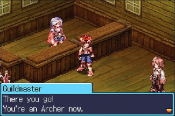
What's worse? Party members are nearly entirely incompetent in battle. Rather than casting effective elemental spells, mages will cast at random, and often, even just run up to attack the enemy. Oddly enough, mages actually need a set amount of space between them and the enemy before they'll cast a spell, which means in any one of the game's few tight corridors, the mages will just get stuck. Likewise, healing classes are equally incompetent. Rather than casting heals to keep party members alive against tough opponents, often healers will cast unnecessary or even irrelevant buffs on party members, literally watching them die. A little bit of skillful maneuvering can save at least the main character from death in a tough fight until the healing character kicks in, but truthfully, this is just another annoyance. Unfortunately, the party member's abilities can't be toggled on or off, which means there will be situations where a priest in the party will cast an area-of-effect healing spell, completely curing everything in the area, including the enemies and bosses, effectively neutralizing or even reversing any progress made in battle.
Now, then, great story and gameplay can overcome AI and control issues, but unfortunately, Ragnarok DS seems to be lacking in both categories. Ragnarok DS is mired with a mediocre story told through one-dimensional characters. The title begins with Ales, a young-adult/teenager filled with angst because his parents are both dead, seeking to become a great "adventurer" someone who performs mostly menial tasks and fetch-quests for paltry sums of money, because he wants to prove to himself that he's better than his father, a man who would help anyone in need, and one day never returned back home afterward. As the story progresses, Ales learns his friends are worth risking his life for, and that having a great adventurer's guild is a secondary goal that comes behind helping others. Most of the game's overarching story is told and concluded in the last third of the length of the game, with the majority told via a party member who leaves at random times, then returns, magically, with information about whatever events are occurring at the time he shows up.
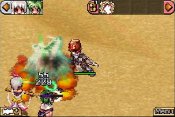
Ragnarok DS's map and progression system represents more of the game's underdeveloped issues. The game only consists of about five total dungeons, each approximately three large maps, but some a little more and others a little less, and a few more than nine transitional maps, where characters can travel from one point of interest to another. Ultimately, this means there's only a few dungeons and areas to traverse. Initially, as dungeons and areas are unlocked, the game seems to be large and expansive, but quickly, the idea will dawn on players that there's little more there. Both story and quest-based missions re-use these few basic areas, forcing players to tread and re-tread these areas looking for various enemy drops or reaching a specific point on the map, where a cut-scene or easy mini-boss battle (where the boss is almost always a large-scaled sprite of a common enemy). Even more unfortunately, the normal enemies of these maps and dungeons rarely ever changed into more difficult or interesting monsters, meaning that most of the quests and the story events that don't unlock something new re-use the same handfuls of enemies, rather than introducing new ones to mix things up gameplay strategies.
Despite all the flaws, there are a few fun and interesting aspects presented in Ragnarok DS. The several character classes all seem to be a bit different, with several unique and often useful abilities, encouraging players to invest time learning the capabilities of all the different classes. In addition, each enemy can drop cards that can be attached to equipment, providing bonus stats and effects, allowing a high degree of character customization and a nice, encouraging method of item collection.
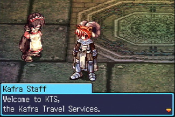
I felt the game's most enjoyable feature was Mirage Tower, which happens to be the only portion of the game capable of multiplayer. In Mirage Tower, players are denied access of their menus, and thus have to rely on limited resources and set equipment builds to make it through the tower's 50 floors five stories at a time. Each fifth story houses a boss, and upon defeat, players are rewarded experience points and the chance to bid on about eight powerful items, relative to the set-of-floors' difficulty. Climbing the tower proves to be very difficult for a single player, while in multiplayer, the tower provides the game's only method of playing with the effective teamwork so desired throughout the game's main story. Even so, there's still a few issues with the tower, for instance, one set of floors has a much more difficult enemy than any found on the next two sets after it, providing an inconsistent difficulty progression on the trip upwards.
Overall, Ragnarok DS is game that provides much of the MMORPG experience through a mostly single-player experience. The title lacks much grace in its transition, and regrettably offers a hollow and repetitive adventure built on MMORPG conventions that don't hold up without a gaggle of other MMORPGers to playing along. In all fairness, Ragnarok isn't all that bad of a game, it's just not all that good, either. Die-hard fans of RPGs waiting for something a bit better and more put-together might want to sink some time into Ragnarok DS, but anyone else would be better off putting their money into a more polished title.







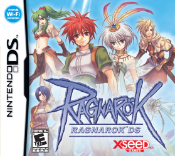

Comments